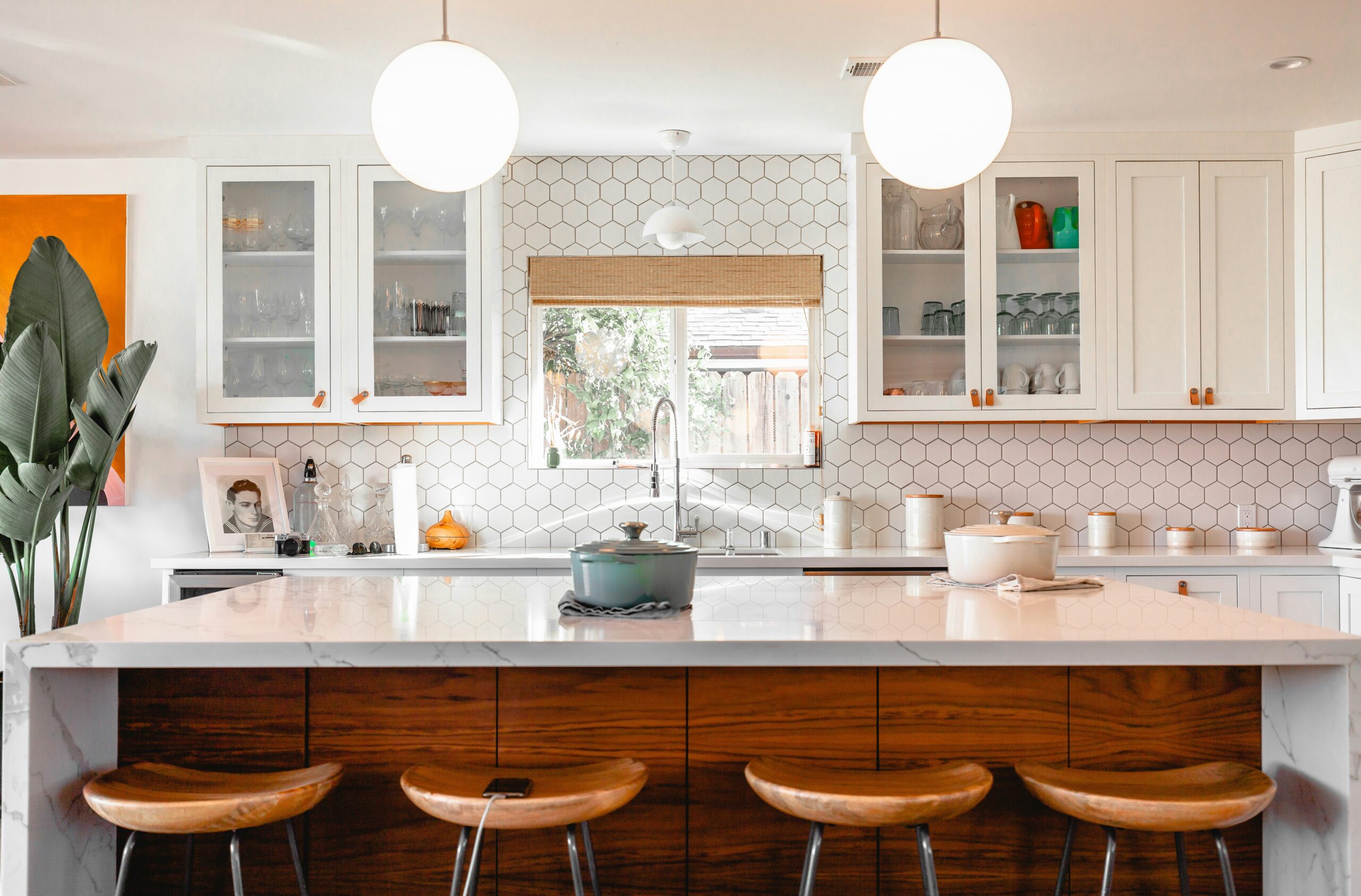When purchasing new kitchen countertops, making the right decision involves balancing your budget, personal preferences, and the functional requirements of your kitchen.
Here are some key steps and factors to consider in order to make an informed decision:
1. Evaluate Your Needs and Lifestyle
- Cooking Habits: If you cook frequently or have a busy kitchen, durability and resistance to heat, stains, and scratches are critical. Materials like quartz and granite are ideal for heavy-duty use, while softer materials like marble may be more prone to damage.
- Maintenance Commitment: Some materials, such as marble, require more upkeep, such as regular sealing. If you prefer low-maintenance options, quartz may be a better fit.
- Aesthetic Preferences: The countertop should complement your kitchen’s design. Think about colors, patterns, and finishes that align with your overall style—whether it’s modern, traditional, rustic, or contemporary.
2. Set a Budget
- Material Costs: Countertops come in a wide range of prices. Set a budget based on the material you can afford. Prices will vary depending on the stone you choose.
- Installation and Extras: In addition to the cost of materials, account for labor, removal of old countertops, sink cutouts, and any additional features like backsplashes, support brackets or bar leveling.
3. Research Countertop Materials
Understand the pros and cons of different materials to match them with your lifestyle and design goals:
- Granite: Durable, heat-resistant, but requires periodic sealing.
- Quartz: Non-porous, low-maintenance, and available in many colors and patterns. Not heat-resistant.
- Marble: Luxurious but prone to staining and scratching.
- Quartzite: Durable, heat-resistant, exotic designs. Requires periodic sealing. Can cost more due to its exotic and sophisticated look .
4. Assess Durability and Longevity
- Scratch Resistance: Materials like quartz and granite are highly resistant to scratches, while softer materials like marble may show wear over time.
- Heat and Stain Resistance: If you often place hot pots directly on the counter, opt for natural materials like granite or quartzite.
- Long-Term Value: Higher-end materials may cost more upfront but offer better durability and add resale value to your home.
5. Consider the Aesthetics and Design
- Color and Pattern: Choose colors and patterns that complement your kitchen’s overall design. Neutral colors like white, gray, or beige are timeless, while bold colors can add personality.
- Edge Profiles: The style of the countertop edge — beveled, bullnose, or waterfall — can affect the final look and price of the countertop.
6. Explore Customization Options
- Sink and Faucet: If you want a customized sink, make sure to let your design consultant know, so they can accommodate this. Some sinks may need cabinet adjustments, such as the farmhouse sink.
- Backsplash Compatibility: Decide whether you want a matching backsplash or a contrasting design. Many materials, like quartz or granite, can be extended for a continuous look, while others may pair better with tile or glass backsplashes.
7. Visit Showrooms and Request Samples
- Hands-On Inspection: Visit a showroom to see the countertop materials in person and feel their texture. Lighting can change how materials look in your kitchen, so request samples and take them home to see how they fit with your lighting and cabinetry.
8. Get Multiple Quotes
- Compare Prices and Services: Obtain multiple quotes from reputable contractors or suppliers. Ensure each quote includes the cost of materials, installation, removal of old countertops, and any additional features you want (sink cutouts, custom edges, etc.). Ensure each quote includes the same scope of work for a fair comparison.
- Check Reviews and References: Research customer reviews, testimonials, or referrals to ensure the company is reliable, offers good customer service, and provides quality installation.
9. Consider Long-Term Maintenance
- Cleaning Requirements: Some materials, like quartz, are non-porous and require minimal maintenance, while others, like granite, marble and quartzite need regular sealing to remain stain-resistant. Know the cleaning and maintenance routine for your chosen material.
10. Understand Warranties and Support
- Warranty Coverage: Ensure that your countertop comes with a warranty. Reputable companies often provide warranties that cover material defects or installation issues. In most cases, natural stones are not covered by warranty as they are natural and pits or chips are likely to happen with time.
- Customer Support: Choose a supplier or installer with good after-sales support in case you encounter issues or need repairs in the future.
By evaluating these factors, you’ll be able to make a confident and well-informed decision when purchasing new kitchen countertops.

